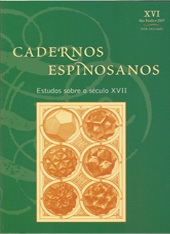Saber, ação e afeto: o problema da acrasia em Aristóteles e Espinosa
DOI:
https://doi.org/10.11606/issn.2447-9012.espinosa.2007.89299Abstract
A passage from Book VII of the Nichomachean Ethics and another from the De Anima by Aristotle allow us the demonstrate that the Philosopher is very near to the "solution" that Spinoza offers to the problem of the akrasia (incontinence or weakness of the will). Circumscribing such problem into the field of appetite and pleasure (epithymia), introducing the notions of desire (oréxis) as the motor or practical action, Aristotle points to an idea of an affective knowledge that, however, will only be completely developed much later, by the theory of affections present in Spinoza´s Ethics. We shall see that in the latter the problem of akrasia acquires another statute and "solution". But if the solution of the problem was not completely formulated by Aristotle, we shall try to show that, embryonically, it was already there, and so Aristotle can be seen as a precursor of Spinoza´s theory of knowledge.Downloads
Download data is not yet available.
Downloads
Published
2007-06-15
Issue
Section
Não definida
License
Autores que publicam nesta revista concordam com os seguintes termos:
- Autores mantém os direitos autorais e concedem à revista o direito de primeira publicação, com o trabalho simultaneamente licenciado sob a Licença Creative Commons Attribution que permite o compartilhamento do trabalho com reconhecimento da autoria e publicação inicial nesta revista.
- Autores têm autorização para assumir contratos adicionais separadamente, para distribuição não-exclusiva da versão do trabalho publicada nesta revista (ex.: publicar em repositório institucional ou como capítulo de livro), com reconhecimento de autoria e publicação inicial nesta revista.
Authors who publish in this journal agree to the following terms:
a. Authors retain copyright and grant the journal the right of first publication with the work simultaneously licensed under the Creative Commons Attribution License that allows to share the work with an acknowledgment of its authorship and initial publication in this journal.
b. Authors are authorized to take on additional contracts separately, to non-exclusive distribution of the article published in this journal (ex.: to publish in institutional repository or as part of a book), with an acknowledgment of its initial publication in this journal.
How to Cite
Paula, M. F. de. (2007). Saber, ação e afeto: o problema da acrasia em Aristóteles e Espinosa. Cadernos Espinosanos, 16, 61-88. https://doi.org/10.11606/issn.2447-9012.espinosa.2007.89299


